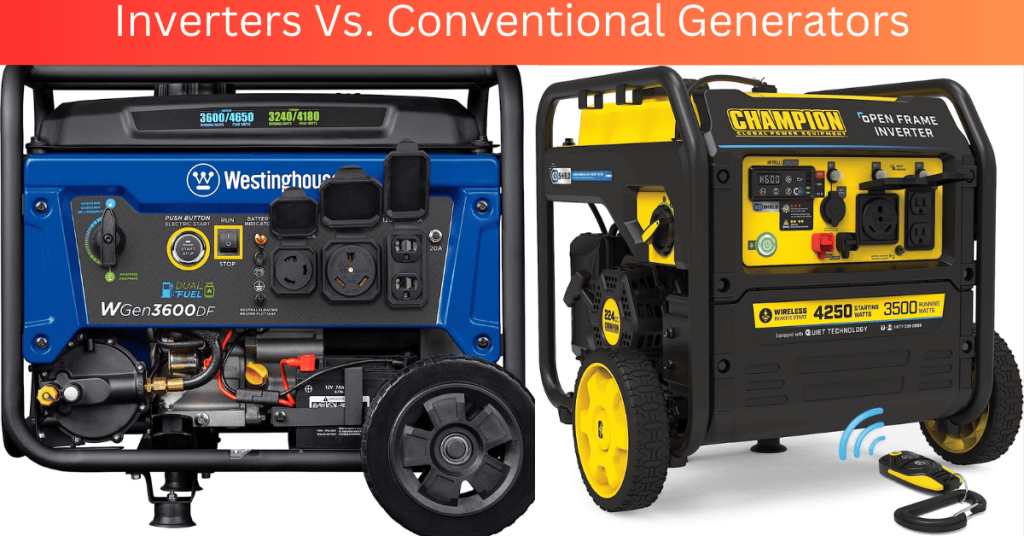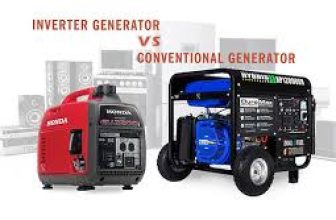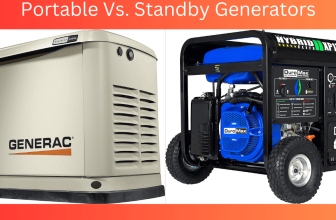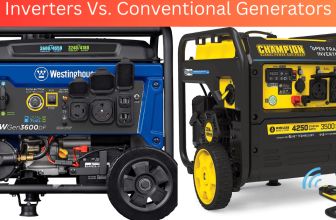Introduction
As a potential customer searching for the perfect generator, you’ve likely come across both inverter and conventional options. But which one is right for you? In this honest review, we break down the differences between inverter generators and traditional portable generators, helping you make a well-informed decision by comparing factors such as fuel efficiency, noise level, power quality, and price.
Key Takeaways
- Inverter generators are generally more fuel – efficient, produce cleaner power output, and run quieter than traditional ones.
- Conventional generators offer more power output for less money but can be loud and have lower fuel efficiency.
- Factors to consider when choosing between the two include fuel efficiency, portability, noise level, power quality, and price.
- Always prioritize safety first by following proper placement guidelines and avoiding carbon monoxide poisoning risks regardless of the type of generator chosen.

Understanding Inverter Generators
Inverter generators work by converting AC power to DC and then back to AC, providing a steady stream of clean power that is safe for sensitive electronics like laptops and smartphones.
How Inverter Generators Work
Understanding the inner workings of inverter generators is crucial for making an informed decision about your power needs. In simple terms, an inverter generator generates electricity by converting mechanical energy into electrical energy.
It starts with a gas-powered engine that turns an alternator, which then produces AC (alternating current) power.
One significant advantage of inverter generators over conventional generators is their ability to produce pure sine wave output with minimal harmonic distortion. As a result, you can safely use these generators to charge sensitive electronic devices like laptops and smartphones without worrying about possible damage caused by fluctuating voltage levels.
Another noteworthy aspect of how inverter generators work is their built-in throttling capability which adjusts engine speed based on demand automatically. This feature not only enhances fuel efficiency but also reduces noise levels considerably compared to traditional portable generators.
Benefits Of Inverter Generators
As a potential customer, you’ll be pleased to know the numerous benefits inverter generators offer that make them a popular choice among consumers. Here are some key advantages of choosing an inverter generator:
- Fuel Efficiency: Inverter generators are designed to automatically adjust their engine speed based on power demand, ensuring they consume fuel more efficiently.
- Clean Power: With advanced technology, inverter generators produce stable and clean power suitable for running sensitive electronics like laptops and smartphones.
- Reduced Noise Levels: These generators operate at lower noise levels compared to conventional ones, making them ideal for use in residential areas or outdoor activities such as camping.
- Portability: Inverter generators are generally lighter and more compact than their counterparts, making them easier to transport and store.
- Parallel Compatibility: Many models allow you to connect two units together, increasing your overall power output without sacrificing portability or efficiency.
- Lower Emissions: Due to their fuel-efficient design, inverter generators produce fewer carbon dioxide emissions than traditional portable generators.
- Versatility: Whether you need backup power for your home or a portable energy source for outdoor activities, there’s an inverter generator that matches your specific needs.
- Multiple Fuel Options: You can choose from gasoline, propane or dual-fuel models, giving you the flexibility to select the best fit for your requirements and preferences.
By considering these benefits, you can make an informed decision when selecting the ideal inverter generator for your needs.
Understanding Conventional Generators
Conventional generators operate by creating AC power through a mechanical process, often using gasoline or diesel fuel as a source of energy.
How Conventional Generators Work
As a generator expert, allow me to explain how conventional generators work in simple terms. The primary function of these generators is to convert mechanical energy into electrical energy by running an engine that turns an alternator.
Think of it like riding your bike – the force from your legs (mechanical energy) moves the chain and wheels (accomplishing a task).
Now, let’s dive deeper into their components. Conventional generators consist of several parts such as an engine motor, fuel tank, battery charger, cooling system, lubrication system, and alternator.
When you fire up a conventional generator with fuel – typically gasoline or diesel – the engine starts running and spins a rotor inside an electromagnetic field created by the stator (two essential parts within an alternator).
However, conventional generators have some limitations; they generate electricity at a fixed speed and provide raw power output with voltage fluctuations that may not be suitable for sensitive electronics.
Benefits Of Conventional Generators
Conventional generators have some benefits that make them a suitable option for certain situations. Here are the advantages of conventional generators:
- High Power Output: Conventional generators offer higher power output than most inverter generators, making them more ideal for powering larger appliances or devices.
- Cost-Effective: Conventional generators are generally less expensive than inverter generators, making them an affordable option, especially for those on a tight budget.
- Fuel Options: Most conventional generators run on gasoline and can also use other fuels like diesel or propane, providing more flexibility when it comes to fuel options.
- Versatility: Because of their high power output capabilities, conventional generators can be used for various applications like construction sites, RVs, and outdoor events.
- Easy Maintenance: Conventional generators require little maintenance and repair costs compared to inverter generators, mainly because they have fewer electronic parts.
- Quick Start-Up Time: Conventional generators start up instantly with just the push of a button or pull of a cord, ensuring timely power supply during emergencies.
- Durability: Since conventional generators have fewer electronic components than inverter generators, they tend to be more robust and rugged, able to withstand harsh weather conditions.
- Widely Available: Traditional portable generators are widely available from different manufacturers and vendors across the country, making them easily accessible when needed.
- Auto Voltage Regulation (AVR): AVR technology is integrated into many conventional generator models which ensures steady voltage output regardless of the load requirements.
Overall, traditional portable generator models remain an excellent option when you need high-output power at an affordable price point with fuel options flexibility included among other benefits stated above.
Comparing Inverter And Conventional Generators
When comparing inverter and conventional generators, there are several key factors to consider such as fuel efficiency, portability, noise level, power quality, and price.
Fuel Efficiency
One of the key factors to consider when choosing between an inverter generator and a traditional generator is fuel efficiency. Inverter generators are more efficient than conventional generators because they adjust their engine speed based on the amount of power being used, which means less fuel is consumed overall.
This also means that inverter generators can run for longer periods of time without needing to refuel, making them ideal for situations where continuous power is needed. For example, I recently took my WEN 56235i Super Quiet Portable Inverter Generator on a camping trip with friends and was impressed by how long it lasted on a single tank of gas.
Additionally, because inverter generators produce clean electricity through electronic circuits rather than mechanical alternators like traditional generators do; this eliminates excessive usage offering even greater savings over time by reducing maintenance needs while benefiting from stable power quality.
Portability
As someone who may need a generator for camping, tailgating, or other outdoor activities, portability is likely an important factor in your decision-making process. Inverter generators are generally more compact and lightweight than traditional generators, making them easier to transport and store.
For example, the Honda EU1000i Inverter Generator weighs just 29 pounds and can be easily carried by its built-in handle.
In addition to weight and size considerations, some inverter generators also come with features like telescoping handles and wheels for greater ease of movement.
The Champion Power Equipment 100520 8750-Watt Open Frame Inverter has both a folding handlebar and never-flat tires to make maneuvering it around your campsite or job site a breeze.
Noise Level
As a Possible Customer, you may be concerned about the noise level of your generator. In general, inverter generators are much quieter than traditional portable generators, making them an excellent choice for camping trips or outdoor events where noise is a concern.
For example, A-iPower’s SUA2000IV 2000-watt portable inverter generator emits approximately 52 decibels of noise while running on high power mode, which is only slightly louder than a casual conversation between two people.
This is significantly quieter compared to conventional generators that can emit an ear-piercing sound of up to 80 decibels or more.
Power Quality
When it comes to generators, power quality is an important factor to consider. Inverter generators produce a clean power output that is safe for sensitive electronics such as laptops and smartphones.
Traditional portable generators, on the other hand, are better suited for powering tools and appliances that require high starting watts. They produce AC power but may have a varying total harmonic distortion (THD) level depending on load demand.
Ultimately, the choice between an inverter generator and a traditional generator depends on your specific needs and intended usage. If you need to power sensitive electronics or require a more stable output of electricity, then an inverter generator would be the best option for you.
Price
As a possible customer, you might be wondering about the cost of inverter generators versus conventional portable generators. It’s worth noting that inverter generators are generally more expensive than conventional ones, but they also offer additional benefits that make them worth considering.
For example, inverter generators produce cleaner power with lower emissions and have better fuel efficiency compared to traditional portable generators. You’ll end up saving money on fuel costs over time because of this increased efficiency.
That being said, if price is your primary concern, a conventional generator may be more suitable for your needs as they typically have a lower upfront cost.
Top Inverter Generators: 2023 Recommendations
Here are the top inverter generators to consider for your power needs in 2023: Champion Power Equipment 100520 8750-Watt Open Frame Inverter, WEN 56235i Super Quiet 2350-Watt Portable Inverter, and Honda EU2200iTAG 2200-Watt Super Quiet Portable Inverter Generator.
Champion Power Equipment 100520 8750-Watt Open Frame Inverter
I recently had the chance to test out the Champion Power Equipment 100520 8750-watt open frame inverter generator, and I must say, I was impressed. This generator is highly rated and for good reason.
It’s 30% quieter than other inverter generators while still providing enough power to fuel an entire house during a blackout. Plus, it’s significantly lighter than traditional generators with wheels for easy portability.
In addition to the Champion generator, there are several other notable options on the market that cater to different needs and preferences such as WEN 56235I Super Quiet Portable Inverter Generator, Honda EU2200ITAG Super Quiet Portable Inverter Generator, Westinghouse iGen4500DF Dual Fuel Inverter Generator and Generac GP Series 6500-Watt Gasoline Portable Generator among others discussed in this article.
Although more expensive than conventional generators, these models are more fuel-efficient and produce lower emissions making them better for both your wallet and environment.
WEN 56235i Super Quiet 2350-Watt Portable Inverter
One of the top inverter generators on the market is the WEN 56235i Super Quiet 2350-Watt Portable Inverter. It’s known for its lightweight design, weighing only 39 pounds, and producing noise levels comparable to a normal conversation.
This makes it highly portable and convenient for camping trips or outdoor activities where space is limited. The WEN 56235i also features two three-prong receptacles, one USB port, and an eco-mode that adjusts fuel consumption based on demand.
With these features, you can power small appliances like a TV or charger without worrying about loud engine noise or using too much fuel.
Honda EU2200iTAG 2200-Watt Super Quiet Portable Inverter Generator
One of the top inverter generators in 2023 is the Honda EU2200iTAG 2200-Watt Super Quiet Portable Inverter Generator. This compact and lightweight generator weighs only 47 pounds, making it easy to transport for outdoor activities like camping or tailgating.
But don’t let its small size fool you – this generator boasts a powerful output of up to 2,200 watts, perfect for powering essential appliances during power outages or emergency situations.
With Honda’s advanced inverter technology, the EU2200iTAG produces clean and stable power with low total harmonic distortion (THD), making it safe to use with sensitive electronics like laptops or smartphones.
Top Conventional Generators: 2023 Recommendations
The Generac GP Series 6500-Watt Gasoline Portable Generator is a reliable and powerful choice for emergency backup power or outdoor events.
Generac GP Series 6500-Watt Gasoline Portable Generator
I recently came across the Generac GP series 6500-watt gasoline portable generator and was impressed with its powerful performance. This conventional generator is designed to handle heavy-duty power needs, making it ideal for powering large appliances or tools on a job site or during an outage.
It’s important to note that traditional generators like the Generac GP Series emit more noise and exhaust emissions than their newer inverter counterparts.
However, if you need high wattage output and are willing to sacrifice some quiet operation for that additional power, then this model may be the best fit for your needs. Additionally, you should always take proper safety precautions when using any portable generator, including proper ventilation and placement away from living spaces.
Westinghouse WGen7500 Portable Generator
I highly recommend the Westinghouse WGen7500 Portable Generator for those in need of a reliable conventional generator. This powerful generator is easy to operate and maintain, making it a great option for both homeowners and travelers.
It has a fuel-efficient engine that can run for up to 16 hours on a single tank, so you won’t have to worry about refueling frequently.
The Westinghouse WGen7500 can power multiple appliances at once, including refrigerators, air conditioners, and televisions, providing essential electricity during power outages or outdoor activities like camping or tailgating.
Additionally, its automatic voltage regulator ensures that your electronics are safe from any damage caused by fluctuations in electrical output.
DuroMax XP4400E 4400-Watt Gasoline Portable Generator
One of the top conventional generators mentioned in this article is the DuroMax XP4400E 4400-Watt Gasoline Portable Generator. It’s perfect for those who need reliable power for their home or outdoor activities such as camping, tailgating or powering up job sites.
This generator has a powerful 7 horsepower air-cooled OHV engine that gives you plenty of power with a run time of up to 8 hours at half load.
Its noise level is only 69dB so it won’t disturb your neighbors or campsite. Plus, the generator runs on gasoline and has an easy-to-use electric start feature which means no more fiddling with cords to get it started.
How To Choose The Right Generator For Your Needs
Assess your power requirements first, then consider portability and space constraints, evaluate fuel options and runtime to determine the best generator for your needs.
Assessing Power Requirements
As a possible customer, it’s important to assess your power requirements before choosing a generator. Here are some factors to consider:
- Determine which appliances and electronics you want to power during an outage or outdoor event.
- Calculate the wattage requirements for each item by checking the label or owner’s manual.
- Add up the total wattage to determine the minimum wattage capacity needed for your generator.
- Consider any additional power needs, such as charging devices or running power tools.
- Purchase a generator with sufficient wattage output to meet your needs.
Remember that larger generators can handle more electricity and power more appliances simultaneously but may also be more expensive and less portable. Choose the appropriate size of generator based on your specific needs and budget.
Considering Portability And Space Constraints
In choosing between inverter generators and traditional generators, it’s important to consider portability and space constraints. Here are some factors to keep in mind:
- Weight: Inverter generators are generally lighter and more compact than traditional generators, which make them easier to move around. Consider the weight of the generator before purchasing, especially if you plan on taking it with you on camping trips or tailgating events.
- Size: Inverter generators come in different sizes, so choose one that will fit your available space. If you have limited space for storage, go for a smaller model.
- Handles/Wheels: Look for models with built-in handles or wheels to make moving them around easier.
- Parallel Capability: If you need more power but don’t want a larger generator, consider an inverter generator with parallel capability. This allows you to connect two smaller models together for more power while still keeping portability in mind.
- Enclosure: If noise is a concern, consider getting an inverter generator with an enclosed design that helps reduce noise levels.
Remember that even though some models may be small enough to carry by hand, they can still weigh over 50 pounds and should only be lifted properly with assistance.
Evaluating Fuel Options And Runtime
As someone who’s considering buying a generator, it’s important to understand the different fuel options available and how they impact runtime. Here are some things to consider:
- Fuel type: The most common fuel types for generators are gasoline, propane, and diesel. Gasoline generators are widely available and easy to refill, while propane generators have longer runtimes and emit fewer emissions. Diesel generators are typically more efficient than gasoline ones but can be more expensive.
- Fuel capacity: The size of the fuel tank will affect how long you can run your generator before needing to refuel. Larger tanks mean longer runtimes but also add weight and reduce portability.
- Economy mode: Many modern generators have an economy mode that adjusts the engine speed based on the power demanded by your appliances. This can extend runtime by reducing fuel consumption when less power is needed.
- Dual-fuel options: Some generators offer dual-fuel capabilities, meaning they can run on both gasoline and propane. This gives you flexibility in choosing your fuel source depending on availability and needs.
- Wattage calculation: It’s important to calculate the wattage required by your appliances to ensure you’re purchasing a generator with enough power to meet your needs. Running a generator at or near its maximum wattage output will consume more fuel than running it at a lower wattage output.
By evaluating your fuel options and considering factors like fuel type, capacity, economy mode, dual-fuel capabilities, and wattage requirements, you can choose a generator that offers the right balance of runtime and efficiency for your needs.
Conclusion
When it comes to choosing between inverter and conventional generators, it all depends on your needs. Inverter generators are generally more fuel-efficient, produce cleaner power output, and run quieter than traditional ones.
However, they also come with a higher price tag.
Ultimately, the decision boils down to what you plan to use the generator for – do you need something portable for camping or tailgating? Or are you looking for a backup power source that can run your entire house during an outage?
Whichever type of generator you choose, always prioritize safety first by following proper placement guidelines and avoiding carbon monoxide poisoning risks.
FAQs:
1. What is the difference between inverter generators and conventional generators?
Inverter generators convert DC power to AC power, providing a clean sine wave output that’s stable for sensitive electronic devices. In contrast, conventional generators produce electricity using an alternator and mechanical engine, typically with a less stable output.
2. Are inverter generators more expensive than conventional models?
Yes, typically inverter generators cost more than traditional models due to their advanced technology and ability to provide cleaner energy. However, they tend to be more fuel efficient which can help offset the initial investment over time.
3. Can I use an inverter generator for my RV or camping trips?
Absolutely! In fact, many RV enthusiasts opt for inverter generators as they are often quieter and lighter weight than their traditional counterparts. Additionally, since they produce steady voltage levels it helps protect sensitive electronics from damage while on the road.
4. Which type of generator is better for emergencies – inverter or conventional?
While both types can serve as backup power sources during outages or other emergency situations – your specific needs depend upon what you’re powering most frequently (i.e., small appliances versus larger equipment) along with your budget constraints & preferred noise level tolerance.. For those seeking quiet operation and uninterrupted service for sensitive electronics like computers or medical equipment then going with an inverter model may be best suited..For those requiring greater capacity/budgetary flexibility when selecting this option but remember that maintenance will also play large factor overtime.





